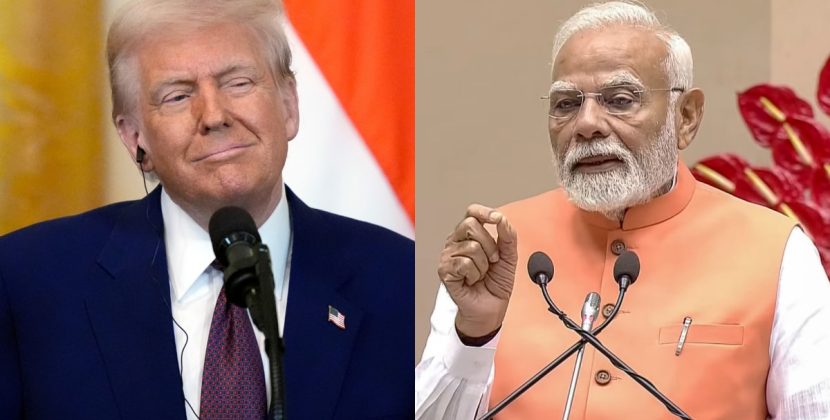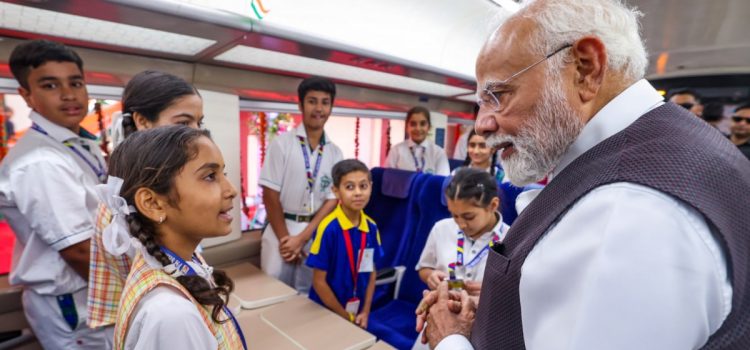
Last Updated:
NEP signifies a change in India’s view of education as catalyst for social advancement, technological leadership, and economic transformation rather than just a way to get a job.
PM Narendra Modi interacting with students. (Image: PMO India)
India is set on achieving the ambitious goal of Viksit Bharat @ 2047, aiming to create a developed, just, and knowledge-driven nation by the centennial of its independence. Central to this aspiration is the emphasis on education and innovation. This national objective is rooted in PM Narendra Modi’s National Education Policy (NEP) 2020 and its transformative vision. NEP 2020 represents a paradigm shift in India’s perspective on education, viewing it as a driving force for social progress, technological leadership, and economic transformation, rather than just a means to secure employment.
The National Research Foundation (NRF) is a new institutional framework designed to promote research, stimulate innovation, and establish India as a global knowledge powerhouse. The NEP’s focus on research and innovation is not just an educational reform; it is also an economic necessity in an increasingly complex and competitive world.
PM Narendra Modi has outlined the NEP to meet global education standards, aiming to empower the youth with skills that make them self-reliant and position India as a global innovation hub. With 128 universities, India is poised to become the world’s second-best-represented nation in the 2026 World University Rankings, behind the United States (171) and ahead of Japan (115) and the United Kingdom (109).
The Indian education system has long suffered due to its outdated curriculum, rigid evaluation methods, and overemphasis on rote learning. Students were taught to memorize information rather than think critically and solve real-life problems. This disconnect between education and innovation has historically constrained the Indian education system.
To address this structural flaw, NEP emphasizes creativity, analytical reasoning, and conceptual clarity across all educational levels. By promoting research-oriented pedagogy, transdisciplinary thinking, and experiential learning, the policy aims to develop a new generation of creatives, innovators, and problem solvers who will drive the nation forward in a knowledge-based economy.
Innovation is crucial for India’s development objectives in the 21st century. Unlike nations like China, India’s path to success must be paved with education, adaptation, innovation, and leadership. Future challenges, from digital infrastructure to green energy solutions, demand a workforce equipped with these skills.
For example, second-tier engineering colleges in Uttar Pradesh, which once produced graduates for monotonous back-end services through rote learning methods, have now established an agri-tech incubation lab with modest funding from NEP’s research grants. Students are using technology and AI models to collaborate with local farmers to design affordable soil health sensors, demonstrating development in action rather than mere schooling.
India is no longer trying to follow Western innovations. Instead, it is developing its concepts to meet domestic needs and prepare for international markets. The shift from passive learning to active knowledge production has significant implications for India’s economy. By building ideas tailored to its people and ready for global markets, India gains credibility in the global search for scalable, cost-effective breakthroughs and supply chain diversification. This inclusive growth fosters rural upliftment and job betterment without excessive industrial expansion or environmental burden.
In the 21st century, intellectual infrastructure is as important as physical assets like bridges, highways, and power grids. According to NEP, developing creative minds capable of dreaming and delivering is crucial. Investments in research and higher education have a multiplying effect. For instance, a researcher could improve agricultural productivity by developing climate-resilient seedlings or revolutionize renewable energy access through effective battery storage. Indian language linguists could digitise and preserve cultural heritage, impacting the economy, governance, and society.
The examples of countries like Israel, Finland, and South Korea, which have few natural resources but have invested consistently in science and education to become global economic leaders, serve as inspiration. India, with its democratic institutions and population advantage, is even better positioned to achieve similar success.
The most beautiful aspect of NEP is its continuity, connecting the dots between school, higher education, and industry. Children exposed to creativity early on are more likely to take risks in college and innovate in their professional lives. Internships and fieldwork allow students to engage with real-world problems, mix streams, and pause and continue their learning.
Additionally, NEP aligns with programs like Digital India, Startup India, and Skill India. Together, these initiatives provide a holistic development model, encouraging young minds to solve national problems, start businesses, and innovate. It is no surprise that India has emerged as the world’s third-largest startup ecosystem with over 100 unicorns and many more to come.
Behind every startup founder is a teacher who encouraged students to ask questions, an institution that promoted exploration, and a government policy that believed in young minds. NEP systematises this support, turning random efforts into intentional ones.
The most significant feature of NRF is its inclusivity. Research in India will no longer be the domain of a select few. State institutions and rural schools, with NRF subsidies, will provide local solutions to local problems with global relevance. For example, a tribal student in Odisha studying traditional herbal medicine might discover a remedy with worldwide applications. A rural engineering graduate designing irrigation equipment for small farmers could influence global food security frameworks.
By integrating modern science with indigenous knowledge systems, India has the opportunity to contribute to the development goals of the Global South. Including women and marginalised groups in the knowledge generation process, validating indigenous knowledge, and conducting research in Indian languages, NEP fosters democratic development.
No reform is without challenges. Implementing policies across India’s vast and diverse educational landscape will face obstacles such as a shortage of trained teachers, inequalities in digital access, and administrative resistance. It is crucial to monitor results, allocate NRF funds transparently, and avoid centralising research authority.
Premature commercialisation is another risk. Education must not focus solely on economic gains. Research inherently involves experimentation, exploration, failure, and long-term planning. India must balance innovation for development with research for its own sake.
As we move towards 2047, Viksit Bharat must become more than a dream expressed in policy speeches. It must become a shared national project where every teacher feels appreciated, every student is motivated, and every researcher feels encouraged. With around 400 million young people, India has the power to influence not only its future but also that of the entire world. We are building the future with intellect and purpose, using NRF as the ladder of opportunity and NEP as the compass.
By 2047, if we remain dedicated, it will be common to see a doctorate candidate publishing research in a tribal dialect, a startup team tackling sustainable energy issues, and a rural girl conducting experiments in a community science lab.
Transforming science into a revolution, education into freedom, and policy into purpose means we are not just creating a developed country but building a creative and thinking nation—a nation with a vision. This must be the essence of Viksit Bharat.
Views expressed in the above piece are personal and solely those of the author. They do not necessarily reflect News18’s views.
Dr Abhishek Ranjan is Research Associate, Department of Political Science, University of Delhi.
Dr Abhishek Ranjan is Research Associate, Department of Political Science, University of Delhi.
view comments
- First Published:
Read More











